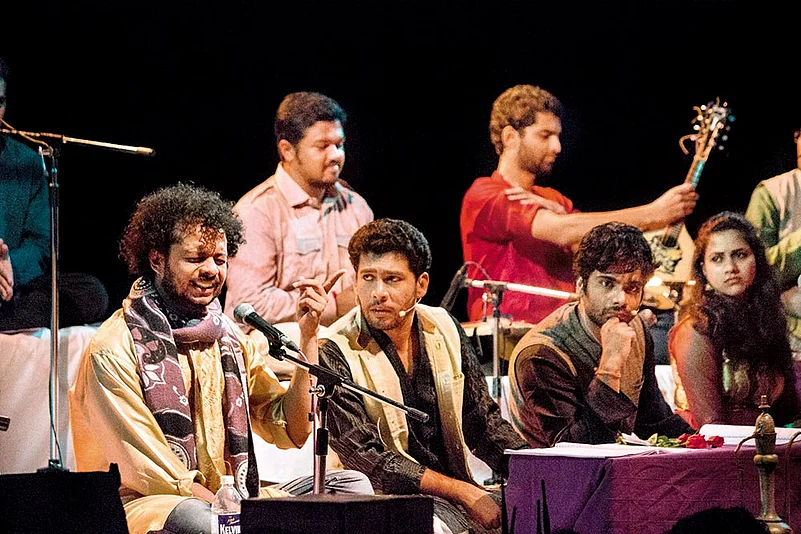Urdu hai jis kaa naam hamiin jaante hain “Daag”
Saare jahaan mein dhoom hamaarii zubaan ki hai
- Daag Dehlvi
Mein kisise apne dil ki baat keh sakta na tha
Ab sukhan ki aad mein kya kuch na kehna aa gaya
- Akhtar Ansari
Urdu, which has its origins in the cosmopolitan melee of military camps, grew to be a language of singular beauty—a medium for classic lyric poetry as well as avant garde modernism. A happy commingling with Hindi resulted in Hindustani, later the language of the Raj and thence of Bollywood. Elevated and encased as national language in Pakistan, Urdu has lost much of the lofty standing in India—except in a few enlightened pools—it enjoyed before Partition.
Now, a group of young performers from Pune has been taking Urdu literature out of its neglected libraries, mixing the profoundly soulful with the outrageously popular through a show that has narration, recitals, songs and qawwalis of Urdu masters, from Mirza Ghalib to Nida Fazli. Titled Sukhan (conversation/speech/poetry), the three-year-old show completed 50 shows this month and had an all-night performance at the Annual Marathi Theatre Festival in Mumbai.
A veritable cornucopia of influences, Sukhan begins with a soulful rendition of O Husna: Heeron ke Ranjho ke nagmein kya ab bhi sune jaate hain wahan O Husna/ Aur rota hai raaton mein Pakistan kya waise jaise Hindustan O Husna….
Yet, soon, director and presenter Om Bhutkar introduces a lashing of humour, with jokes cracked about failed affairs of the performers, with Faiz Ahmad Faiz’s Kuch ishq kiya, kuch kaam kiya or Apne sab yaar kaam kar rahe hai, aur hum hain ki naam kar rahe hai by Jaun Eliya.
Before giggling youngsters get into a frolicsome mood, he reads out a story, Dimakonki Malika Se Ek Mulaqat, about the plight of the Urdu language, by Mujtaba Husain. Then, Avanti Patel or Mukta Joshi render apki yaad aati rahi, chashm-e-nam thartharati rahi, raaatbhar by Makhdum Mohiuddin. It’s greeted by a hushed auditorium. The show continues with Bait Baazi (a sort of antakshari of Urdu poetry/sher), ghazals and climaxes with a burst of energy in two qawwalis (one before intermission, one in the end). Made of disparate components, the three-hour-long performance feels like an integrated whole.
“Urdu and Hindi have the same grammar so most people get what is going on. But it is crucial that they understand the nuances. Selection of the material is important, because we want the audience to engage and understand without making it shallow,” says Om, a Marathi actor (Nude), who has conceptualised and directed Sukhan. What seems to be a well-crafted jigsaw puzzle took five to six years to put together. Nachiket Devasthali, Sukhan’s co-presenter, met Om in 2011 and the two bonded over their love for Urdu shayari.
“We organised an open forum to celebrate Nusrat Fateh Ali Khan’s birthday on October 13, 2014. It received a good response and I told Om to create something more. Eventually Sukhan happened after much research,” says Nachiket, whose gentler renditions are a perfect foil to Om’s exuberant narration.
“Our first performances were at people’s houses–in apartments with 20 people as audience,” says Abhijit Dhere, whose qawwali sends the audience into raptures. “I think what really binds us is that we are all serious about the content and Nusrat Fateh Ali Khan,” he says, adding that the lure of the popular is qualified by a desire for what has stood the test of time. The performers are vastly different in their professional and personal lives, with stage chemistry binding them into a whole. Some are classical singers like Jaideep Vaidya, some like Om do not sing, some are teenagers and some twice as old. Each is part of a team act, and also has a solo act.
“Everyone was doing something in their own space; Sukhan brought them together and helped them find meaning,” says music composer Devendra Bhome. “If you come for music, you discover poetry and if you are well-versed in poetry, there is music,” he adds. The team performed, to the obvious appreciation of all, at the prestigious Jashn-e-Rekhta Festival in Delhi. Sukhan has also been performed in Abu Dhabi and Qatar.
“Initially, we were worried about Delhi, a centre of Urdu, because so far we had performed largely before Marathi or non-Urdu speaking audience. But it worked despite having a floating audience and open performance,” says Abhijit. However, Sukhan’s exacting standards have ensured that despite being an all-Marathi (and one Gujarati) team, the attention to pronunciation and well-established narrative techniques is impeccable. “We are mostly self-trained. I can read and write Urdu a bit, but it’s largely about reading and listening a lot,” says Om.
Then there are the memories, framed in success. For Mukta Joshi, (there is one female performer; Mukta and Avanti Patel alternate) it was a chance rendition of Aapki Yaad Aati Rahi, originally sung by Chhaya Ganguly in Gaman. “I was supposed to sing another ghazal, but just ten minutes before the show Om asked me to sing Aapki Yaad. After I had sung it, during the intermission, a lady came to meet me and she said she loved my rendition. It was Chaya Ganguly herself. We sing it differently and for her to appreciate it was a high point.” She adds that rigorous rehearsals with Om, where meanings of words are dissected, have helped her to sing better.
One particularly warm experience occurs often. Be it in Ahmednagar, Aurangabad or Mumbai, the team is congratulated by emotional members of the audience, thanking them for bringing Hindus and Muslims together.
The team is also aware of the inexorable pull, the inimitable romance, of Urdu. “We all are attracted to Urdu. People love anything that is said in a couplet; they love this form of poetry and perhaps because it is performed by us, they are more accepting, as if like, yeh toh apne dost kuch kar rahe hai,” says Om, reiterating how Sukhan has always been well-received. “The Marathi audience wanted this, needed this,” Nachiket adds.
Om adds that Sukhan would not have scaled these heights were it not for their indefatigable producer, Kushal Khot, and the relentless encouragement from eminent personages of the Marathi film industry. “They supported us…making calls for us, telling others about us. Everyone said this was UNIque.” Shripad Padmakar, producer of the Mumbai shows of Sukhan says, “I realised its potential when I had gone to see a show for some time and cancelled the next meeting to stay till the end. The level of Urdu, diction and literature was perfect...and all this from a bunch of Marathi boys, it’s extraordinary.”
But true success in art has traces on the impress it leaves on the fabric of life. After Sukhan’s success, college-going students in Pune have gravitated towards Urdu and have started organising Mushairas. Not to mention the enthusiastic reception accorded to the celebration of Nusrat’s birth anniversary, now a three-day festival. “Some youngsters are formally learning Urdu. They have couplets on their Facebook walls. It’s nice to see that Sukhan has prompted something,” says Kushal Khot. Possibly not realising it, newly-minted aficionados of Urdu poetry are looking up classical literature penned generations back, and they are not all about love and longing; many convey an explicit, impatient desire for truth and justice.
Om and his team wear the accolades lightly, “We are just a medium. We are just discovering and presenting material for everyone to enjoy,” says Nachiket.
What does the future hold for team Sukhan? Om, a lover of cricketing metaphors, likens this period to the middle overs, which must be played out patiently. “We shouldn’t do anything reckless. We take time between shows to refuel. It is emotionally and creatively draining but we must maintain standards, or else it will become an orchestra.” But what’s the driving force behind the painstaking research, the relentless work on rehearsals? “I want to stay in that moment of discovering and sharing a new poem, a different couplet, a new piece of literature. I want to stay in that poetry,” Om says. Needless to say, his fellow travellers—the team and the audience—would passionately and wholeheartedly acquiesce.


























